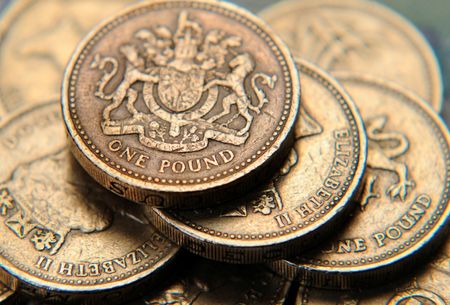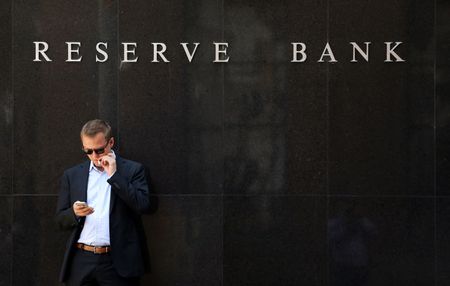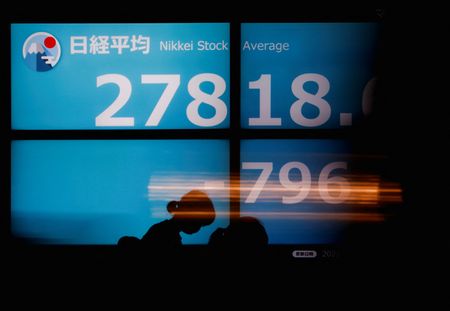 1
1 1
1



By Amanda Cooper
LONDON (Reuters) -Global stocks rallied for a second day on Tuesday, after Britain’s decision to ditch part of a controversial tax-cut plan and slightly paler expectations for aggressive central bank action returned some confidence to investors.
UK Finance Minister Kwasi Kwarteng on Monday announced the government would back down on reversing a tax break for top earners that formed part of a package aimed at boosting growth.
This measure only makes up a small part of the 45 billion pounds in unfunded tax cuts that sent the pound crashing to record lows and wreaked havoc in the gilts market.
But it was enough to soothe some of the recent angst in the market and, together with emergency bond buying from the Bank of England, sterling was set to make up most of the losses incurred since the mini budget was unveiled on Sept. 23.
Adding to the sense of relief among investors, who endured one of the most volatile quarters in recent history in the three months to September, was Australia’s central bank, which lifted interest rates by far less than expected..
A weaker read of U.S. manufacturing activity helped temper expectations for more hefty rate rises by the Federal Reserve.
However, some analysts said this optimism may be misplaced.
“My firm view, however, is that this will not be the case. While, technically, having a dual mandate, the Fed have effectively become a single-issue central bank; that issue being bringing inflation back to the 2% target,” Michael Brown, chief strategist at CaxtonFX, said.
“Unless we see a few months of consecutive improvement in inflation data, it’s tough to envisage any sort of pivot, with another 75 bps hike remaining my base case for next month’s decision. It’s tough to be long risk with that on the radar.”
The MSCI All-World index was last up 0.9% on the day, while stocks in Europe headed for their biggest one-day rally in over three months, as the Stoxx 600 traded 2.6% higher and London’s FTSE gained 1.8%.
The pound, meanwhile, rose 0.3% against the dollar to trade at $1.1363, having pared some of the day’s gains. Sterling has risen by more than 10% since the mini-budget.
The dollar slid against a basket of major currencies, as the euro and the pound made upward headway and Treasury yields slipped in light of a shift in investor expectations for the path of U.S. interest rates.
U.S. benchmark 10-year yields fell by nearly 20 basis points on Monday, having topped 4.0% just last week. They were last down 9 bps at 3.5657%.
“Noticeably, that move lower was entirely driven by a fall in real yields, with inflation breakevens moving higher on the day, which is again a sign that investors are pricing in a much less aggressive reaction from the Fed,” Deutsche Bank strategist Jim Reid said in a daily note.
ENJOY IT WHILE IT LASTS
After September, when global bonds witnessed one of the biggest sell-offs in decades and any currency other than the dollar appeared to crumble, market watchers said a snap back, aided by better sentiment in the UK market, was not unusual, but would likely be short-lived.
“The about-face … will not have a huge impact on the overall UK fiscal situation in our view,” said NatWest Markets’ head of economics and markets strategy John Briggs.
“(But) investors took it as a signal that the UK government could and is at least partially willing to walk back from its intentions that so disrupted markets over the past week.”
S&P 500 futures rose 1.8%, following a 2.6% bounce for the index overnight, suggesting a second day of gains may be in the offing on Wall Street later. [.N]
Other indicators of market stress are still flashing red. The CBOE Volatility Index remains elevated and above 30. Shares and bonds of Credit Suisse hit record lows on Monday as worry about the bank’s restructuring plans swept markets, although some of these losses reversed on Tuesday.
Japan’s yen hit 145 to the dollar on Monday – a level that prompted official intervention last week – and was last at 144.65, while the euro was up 0.8% at $0.9895, about 5.5% above last week’s 20-year low. [FRX/]
“More volatility is almost certainly assured as FX markets re-focus on U.S. recession risks, which continue to build,” said ANZ senior economist Miles Workman, with U.S. jobs data on Friday the next major data point on the horizon.
Oil rallied for a second day, boosted by the prospect of output cuts from the world’s biggest exporters, leaving Brent futures up 1.1% at $89.84 a barrel.
(Additional reporting by Tom Westbrook in Sydney; Editing by Sam Holmes and David Evans)